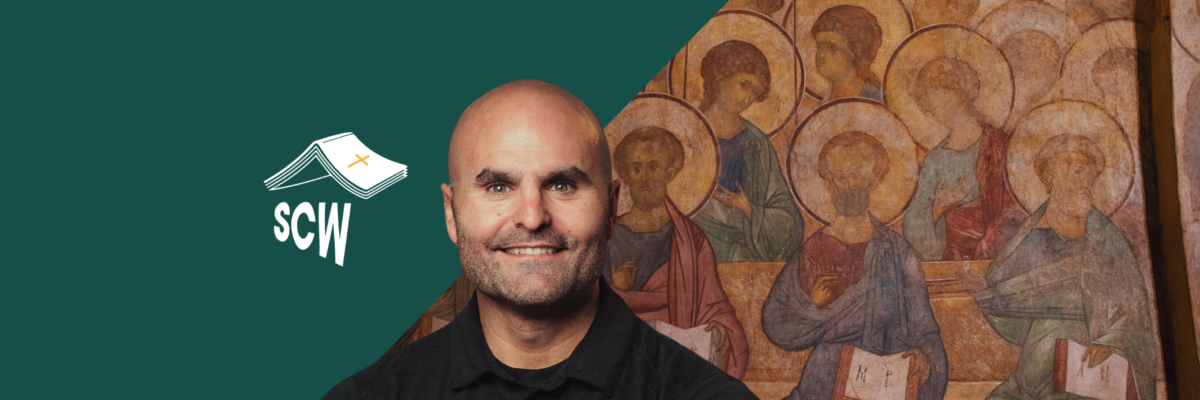
Episode 108: Year C – 3rd Sunday of Advent
In this episode, we focus on details from each of the readings for this upcoming 3rd Sunday of Advent, Year C. The first detail, which is found in the first reading, taken from Zephaniah 3:14-18, is the prophecy of the day for Israel to rejoice, the theme for Gaudete Sunday. The related topic, so I will argue, is Jesus’ divinity. The second detail comes from the second reading, taken from Philippians 4:4-7, and the related apologetical topic is the intercession of the saints. One of Paul’s exhortations seems to conflict with the Catholic practice of invoking the saints to intercede for us. The remaining two details come from the Gospel reading, which is taken from Luke 3:10-18. The two apologetical topics are the Sacrament of Baptism and the reality of Hell.
Readings: Click Here
Looking for Sunday Catholic Word Merchandise? Look no further! Click Here
Hey everyone,
Welcome to The Sunday Catholic Word, a podcast where we reflect on the upcoming Sunday Mass readings and pick out the details that are relevant for explaining and defending our Catholic faith.
I’m Karlo Broussard, staff apologist and speaker for Catholic Answers, and the host for this podcast.
In this episode, we’re going to focus on details from each of the readings for this upcoming 3rd Sunday of Advent, Year C. The first detail, which is found in the first reading, taken from Zephaniah 3:14-18, is the prophecy of the day for Israel to rejoice, the theme for Gaudete Sunday. The related topic, so I will argue, is Jesus’ divinity. The second detail comes from the second reading, taken from Philippians 4:4-7, and the related apologetical topic is the intercession of the saints. One of Paul’s exhortations seems to conflict with the Catholic practice of invoking the saints to intercede for us. The remaining two details come from the Gospel reading, which is taken from Luke 3:10-18. The two apologetical topics are the Sacrament of Baptism and the reality of Hell.
Let’s start with the first reading, again, taken from Zephaniah 3:14-18. Zephaniah prophesies,
Shout for joy, O daughter Zion!
Sing joyfully, O Israel!
Be glad and exult with all your heart,
O daughter Jerusalem!
The LORD has removed the judgment against you
he has turned away your enemies;
the King of Israel, the LORD, is in your midst,
you have no further misfortune to fear.
On that day, it shall be said to Jerusalem:
Fear not, O Zion, be not discouraged!
The LORD, your God, is in your midst,
a mighty savior;
he will rejoice over you with gladness,
and renew you in his love,
he will sing joyfully because of you,
as one sings at festivals.
The detail that I want to focus on is the exhortation for Israel to “shout for joy” and “be glad.” In other words, the prophecy is for Israel to “rejoice.” Why? Because “the King of Israel, the Lord, is in your midst . . . the Lord, your God.”
This prophecy serves as a backdrop for Gabriel’s annunciation to Mary: “Hail, full of grace” (Luke 1:28). The Greek word translated “hail,” chairō, also means “rejoice” or “be glad.” Luke seems to be telling us that Gabriel’s announcement for Mary to “rejoice” is the fulfillment of Zephaniah’s prophecy.
Now, remember, Zephaniah’s prophecy announced a day of rejoicing on account of the God of Israel being amid his people. Gabriel tells Mary, the embodiment of the People of Israel, to rejoice on account of the Father’s plan for the Messiah, Jesus, to be born.
What’s the significance? Luke is revealing to us that Jesus is the God of Israel who will dwell amid his people. For this reason, Mary is told to rejoice. And with God’s coming comes salvation.
For us as Catholics, we rejoice every Sunday on account of the God of Israel being made present on the altar in the Eucharist to give us salvation. But during this season of Advent, in preparation for Christmas, we remember his first coming, in which he gifted us with his divine presence and brought us salvation.
Okay, let’s now turn to the second reading. Again, it’s taken from Philippians 4:4-7. Here’s what Paul writes:
Rejoice in the Lord always.
I shall say it again: rejoice!
Your kindness should be known to all.
The Lord is near.
Have no anxiety at all, but in everything,
by prayer and petition, with thanksgiving,
make your requests known to God.
Then the peace of God that surpasses all understanding
will guard your hearts and minds in Christ Jesus.
The detail that has apologetical significance is Paul’s statement, “in everything, by prayer and petition, with thanksgiving, make your requests known to God.” For a Christian who opposes the Catholic and Orthodox practice of invoking the saints to pray for us, they might appeal to this passage and argue, “You see, the Bible says to make our prayers requests known to God alone.”
The problem with this objection is that Paul doesn’t say make our prayer requests to God alone. He simply exhorts us to make our prayer requests to God. This no more excludes making our requests known to the saints than it excludes making our requests known to other Christians here on earth.
If someone appeals to this text to disprove the good of invoking the saints in heaven, then they must, on the same grounds, reject the good of invoking the saints here on earth, i.e., Christians. For Christians who don’t want to go that far, they can’t appeal to this text as evidence against the practice of invoking the intercession of the saints.
The bottom line is that it’s not a matter of either making our requests known to God or making our requests known to the saints. Rather, it’s both-and. For more information on this topic, see my new book The Saints Pray for You: How the Christians in Heaven Help Us Here on Earth.
Let’s now turn to the Gospel reading. It’s taken from Luke 3:10-18. Luke records,
The crowds asked John the Baptist,
“What should we do?”
He said to them in reply,
“Whoever has two cloaks
should share with the person who has none.
And whoever has food should do likewise.”
Even tax collectors came to be baptized and they said to him,
“Teacher, what should we do?”
He answered them,
“Stop collecting more than what is prescribed.”
Soldiers also asked him,
“And what is it that we should do?”
He told them,
“Do not practice extortion,
do not falsely accuse anyone,
and be satisfied with your wages.”
Now the people were filled with expectation,
and all were asking in their hearts
whether John might be the Christ.
John answered them all, saying,
“I am baptizing you with water,
but one mightier than I is coming.
I am not worthy to loosen the thongs of his sandals.
He will baptize you with the Holy Spirit and fire.
His winnowing fan is in his hand to clear his threshing floor
and to gather the wheat into his barn,
but the chaff he will burn with unquenchable fire.”
Exhorting them in many other ways,
he preached good news to the people.
There are two details here that I want to highlight. The first is John the Baptist’s distinction between his water baptism and Christ’s baptism by the Holy Spirit and fire.
For some Christians, this might seem to be evidence that ritual water baptism, like in the Sacrament of Baptism, doesn’t save us, since John the Baptist draws a distinction between his ritual water baptism and the baptism by the Spirit and fire, which for many Christians refers to the moment of salvation. Such distinction seems to exclude ritual water baptism from the transforming power of the baptism by the Spirit, thereby disproving the idea that the Sacrament of Baptism can be a means of salvation.
In response, this could simply refer to the “baptism of the Holy Spirit” that comes on the Day of Pentecost, which for us Catholics is perpetuated in the Sacrament of Confirmation, and does not involve ritual water baptism, since that’s part of the Sacrament of Baptism. A distinction between John’s ritual water baptism and the “baptism of the Holy Spirit” on the Day of Pentecost doesn’t logically entail a denial of the transforming power in the Sacrament of Baptism.
Now, if we interpret this prophesied baptism of the Holy Spirit as also referring to the Sacrament of Baptism, it still wouldn’t follow that such a baptism of the Spirit is mutually exclusive from ritual water baptism. The distinction that John makes simply could be intended to reveal that his ritual water baptism doesn’t have the transforming power of the Spirit, whereas Christ’s ritual water baptism will.
Either way, this text doesn’t disprove the salvific efficacy of the Sacrament of Baptism.
The second detail in this Gospel reading that has apologetical significance is John’s prophecy about Jesus coming to “burn” the “chaff” with “unquenchable fire.” The distinction between the “wheat” and the “chaff” refers to Jesus distinguishing between the righteous and the unrighteous, the good and the bad, or the sheep and the goats in Matthew 25:31-46.
Now, Jesus says the unrighteous, represented by the “chaff,” will be burned with an unquenchable fire. Surely, this can’t refer to a temporary punishment, like in the case of purgatory, since the fire is “unquenchable.” Therefore, it must be a reference to a permanent, or definitive, punishment, which is the essence of hell.
So, we have revelation from the John the Baptist of the reality of hell, or, if you interpret this as what theologians call a conditional prophecy, the possibility of hell.
Conclusion
Well, my friends, that’s brings us to the end of this episode of the Sunday Catholic Word. The readings for this upcoming 3rd Sunday of Advent, Year C provide us opportunity to reflect on several different apologetical topics:
- The divinity of Jesus,
- The good of invoking the saints for their intercession,
- The Sacrament of Baptism, and
- The reality of hell.
As always, thank you for subscribing to the podcast. And please be sure to tell your friends about it and invite them to subscribe as well at sundaycatholicword.com. You might also want to check out the other great podcasts in our Catholic Answers podcast network: Trent Horn’s The Counsel of Trent, Joe Heschmeyer’s Shameless Popery, and Jimmy Akin’s A Daily Defense, and Tim Staples’ 1-on-1 with Tim, all of which can be found at catholic.com.
One last thing: if you’re interested in getting some cool mugs and stickers with my logo, “Mr. Sunday podcast,” go to shop.catholic.com.
I hope you have a blessed 3rd Sunday of Advent, Year C. Until next time, God Bless!



